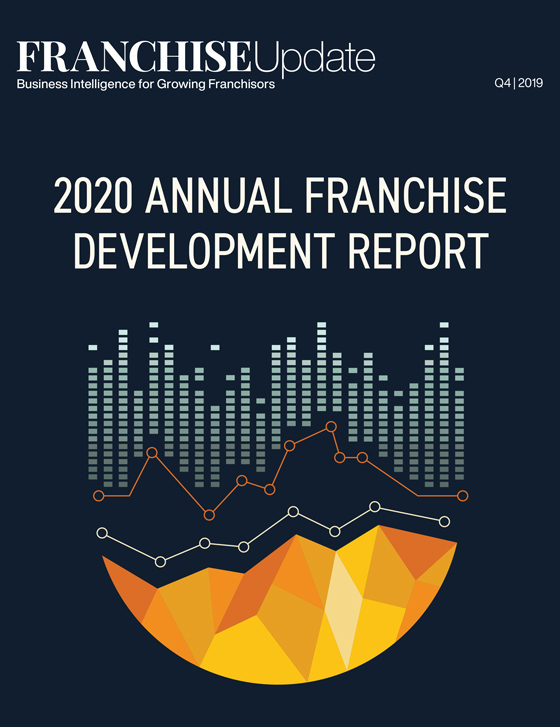2020 Global Trends: What's Ahead in International Franchise Development

Despite the political, economic, and trade "festivities" going on around the world today, there are increasing opportunities for new franchise global development in 2020 and beyond. I asked international franchise specialists in my network who reside and work in various regions of the world for their advice for 2020.
Rosemarie Hartnett, President, Abrakadoodle (US)
As franchising continues to mature in countries around the world, international franchise brands face greater requirements for adherence to franchise regulation overseas. While this can raise the responsibilities and expense of taking your brand international, this maturity also drives growing opportunities in these international markets. The interest in franchising is also evident in the growing number of countries seeking educational courses and mentorship from the U.S. through programs offered by the IFA and the ICFE program. While food concepts continue to be among top brand expansions overseas, children's educational concepts born in the U.S. also continue to reflect positive growth among investors looking to build quality educational programs for children through U.S. franchise brands. American franchisors across all industries can expect better-educated international franchise candidates with high expectations for initial and ongoing support and training. And that's a good thing!
Marc Muskin, VP International Sales & Development, CKE Restaurants (US)
For U.S.-based franchisors, the coming year carries irony in its very name: we use the term "20/20" to describe perfect vision, but nothing could be further from the truth about the outlook for next year. What to expect in the next year is unclear and uncertain. From major political elections to trade relations, currency rates to interest rates, nobody can predict where things will be by the end of 2020. And in high-investment international franchising that's disruptive, to say the least. From Turkey to Brazil, Canada to the Philippines, the United Kingdom to Australia and the Middle East, we are seeing business conditions change, positively and negatively. Either way, investors are generally taking a wait-and-see approach to new ventures. Smart, well-established franchisors can get through 2020 as long as they keep a steady hand on the fundamentals: open and transparent relations with franchisees; consistent, positive brand management; and sticking to the fundamentals of healthy franchising including rigorous selection criteria for new franchisees and prudent deal points reflecting these uncertain times. (CKE operates in more than 30 countries.)
Ned Levitt, Partner, Dickinson Wright, Toronto (Canada)
Looking into my crystal ball for 2020, the influence and impact of franchising in Canada will continue to increase. We will see more foreign franchise brands moving into Canada, which will present increasing opportunities for Canadians to become master and multi-unit franchisees. Currently, the greatest activity is in the business sectors offering services and products for seniors and, at the opposite end of the life cycle, for children. The marketing of franchise opportunities is changing rapidly in Canada, as it is around the globe. In 2020 we will see less and less franchise marketing activity in print and at trade shows and more activity online. Finally, Canadian franchisors have discovered that there is a world outside of Canada. More Canadian franchisors will attempt international expansion in 2020 than have ever been done before.
Jose Enrique Tellez, US Commercial Service Franchise Specialist (Retired), Panama City
Central America is highly receptive to U.S. franchises. Panama, Guatemala, and Costa Rica have the strongest economies in Central America and therefore are the most promising markets. The development of a strong middle class in Central America as well as the construction of modern shopping malls favors the establishment and expansion of franchises in major cities. There are approximately 300 franchise concepts in Central America. More than 90 percent of the total number of franchises in the country are from foreign countries. The U.S. is the market leader with a participation above 60 percent of foreign franchises. Food franchises represent about 70 percent of the franchises in Central America. But the market is opening for other concepts such as retailing, health care, gyms, education, hotels, entertainment, real estate, etc. Main factors determining successful market penetration are brand name recognition, competitive prices, good support, product quality, and strong promotion. There are no special laws regulating the franchising sector.
Iain Martin, International Franchising Consultant, The Franchising Centre (UK)
As of this writing, the political shenanigans continue in the U.K., which means that we still have no clarity about if and when we will leave the European Union. This creates uncertainty in the investment marketplace, and my experience is that decisions are being deferred until we have a stable landscape within which to operate (either in or out!). This tends to affect higher-value businesses, especially where long-term commitments are required, or the supply chain includes imported goods. In addition, the changing face of retail (e-commerce rather than bricks and mortar) means that property costs can seem disproportionately high. Landlords are being slow to recognize the changing reality and will need to drive traffic to their malls, etc. to justify the rents charged. However, there are opportunities for retail concepts where customers must be present (e.g., certain types of entertainment, food, and some health and beauty concepts). The changing demographics of the U.K. mean that personal services such as home care are in demand. A slowing housing market, the result of less frequent house moves, means that home services (renovation, remodeling, etc.) are in demand. Some food and beverage concepts continue to thrive. Coffee brands are in high demand, although customers are looking for points of differentiation. Good quality coffee is a given--it's the other elements of the customer experience that make certain brands attractive. The days of the "Starbucks lookalike" are drawing to an end!
Daniel Szollosi-Nagy, Your Concierge Consulting (Hungary)
The Czech Republic, Hungary, Poland, and Slovakia have similar levels of economic development and can be treated as one for the purpose of franchise development. Having emerged from a Communist market structure 30 years ago, and having joined the European Union 15 years ago, these countries have a combined population of nearly 65 million, around 12 percent of the total EU population. Compared with the U.S. and EU average, these countries are underserved by franchises as a proportion of the retail sector. With these countries increasing their GDP at a faster rate than the rest of the EU countries, there are significant growth opportunities for U.S. franchisors. The key to a successful market entry in this region is the ability to adapt franchise concepts and terms, advertising, and capital requirements to each market. Brands without a global brand awareness must be prepared to commit sufficient resources.
Sanjay Duggal, Vice President of Business Development, Middle East and North Africa Franchise Association, (Dubai)
Because of saturation in the retail and food beverage space (which is also challenged by online selling), new sectors of franchising are being explored more actively. The UAE has witnessed its own significant growth in franchising over the past two decades, most of which has come from corporate investments. But franchising isn't meant to be just a corporate domain, nor is it meant to be monopolized by a few sectors. With the culture of entrepreneurship getting stronger by the day, there are countless individuals from various backgrounds desiring to carve out their own niche in the business universe. Whereas the recent migration of unconventional franchises from the fringes to center stage might be partly due to the Millennial mindset, it is also the result of circumstance, with some sectors saturated while others are grossly underserved.
Albert Kong, Senior PMC, Chairman/CEO, Asiawide Franchise Consultants (Singapore)
Asia, being quite very diverse, ranges from nations like China (Greater China includes Hong Kong, Macao, and Taiwan), India, Japan, and Korea, to Southeast Asia and its 10 different nations (see below). With differences in race, language, culture, and religion, different countries would commonsensically have different wants (for example, halal versus non-halal foods; services catering to the elderly in an aging society versus a younger one, etc.). However, there are certain common trends taking place in many parts of Asia. The trend of "premier" or more "Instagrammable" fast foods coming to Asia will continue, as will STEM-type enrichment franchises where children learn coding and robotics. Asian parents are known to be more anxious than others about their children's future, so any help to give their children a leg up in the future will have a market, especially if it is high-tech and futuristic.
Sean Ngo, CEO/Co-Founder, VF Franchise Consulting, Ho Chi Minh City (Vietnam)
Some clear franchising trends are apparent across Asia. These trends in many ways reflect the young, though fast maturing, population focused on healthier and more sustainable living, driven by higher disposable incomes and living standards. Nowhere is it more noticeable than in the F&B, lifestyle, and education industries. Food establishments that focus on healthier, higher-quality, and fresh food have seen a meteoric rise throughout Asia. An estimated 25,000 fitness clubs exist across 14 regional markets in Asia, and the annual spend is US$16.8 billion. A swelling middle class and rising household incomes are also driving significant growth in private education spending. Asia/Pacific's private education market is estimated to be worth a staggering US$370 billion, with childhood education leading the growth of this category.
Stewart Germann, Stewart Germann Law Office, Auckland (New Zealand)
Trends in franchising in both New Zealand and Australia suggest more multi-unit ownership by franchisees. In New Zealand, with no franchise-specific legislation, it is very easy for new brands to enter and be adopted, unlike in Australia with its franchise legislation. I see fitness centers continuing to expand, especially in New Zealand. Many people strive to be fit and have a daily routine in a suitable gym, which often is open 24/7. With e-bikes and electric scooters becoming prevalent, this trend will continue well into 2020 and beyond. With 630 brands in New Zealand, there is certain to be further expansion with professional and dedicated franchisors striving to do better in the interest of making franchisees more profitable.
William Edwards is the CEO of Edwards Global Services (EGS). From initial global market research and country prioritization to developing new international markets and providing operational support around the world, EGS offers a complete international operations and development solution for franchisors based on experience, knowledge, a team on the ground in more than 40 countries, and trademarked processes based on decades of problem-solving. Contact him at [email protected] or +1-949-224-3896.
Share this Feature
Recommended Reading:
FRANCHISE TOPICS
- Multi-Unit Franchising
- Get Started in Franchising
- Franchise Growth
- Franchise Operations
- Open New Units
- Franchise Leadership
- Franchise Marketing
- Technology
- Franchise Law
- Franchise Awards
- Franchise Rankings
- Franchise Trends
- Franchise Development
- Featured Franchise Stories
FEATURED IN

Franchise Update Magazine: Issue 4, 2019








 The franchise listed above are not related to or endorsed by Franchise Update or Franchise Update Media Group. We are not engaged in, supporting, or endorsing any specific franchise, business opportunity, company or individual. No statement in this site is to be construed as a recommendation. We encourage prospective franchise buyers to perform extensive due diligence when considering a franchise opportunity.
The franchise listed above are not related to or endorsed by Franchise Update or Franchise Update Media Group. We are not engaged in, supporting, or endorsing any specific franchise, business opportunity, company or individual. No statement in this site is to be construed as a recommendation. We encourage prospective franchise buyers to perform extensive due diligence when considering a franchise opportunity.